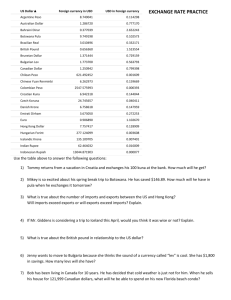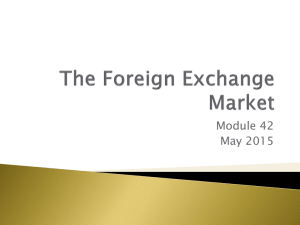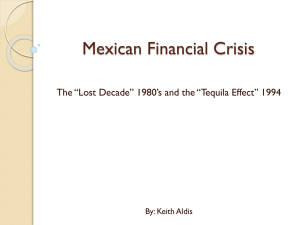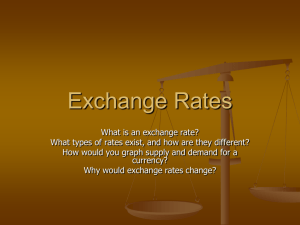Foreign Exchange Commentary – Mid Day Remarks
advertisement
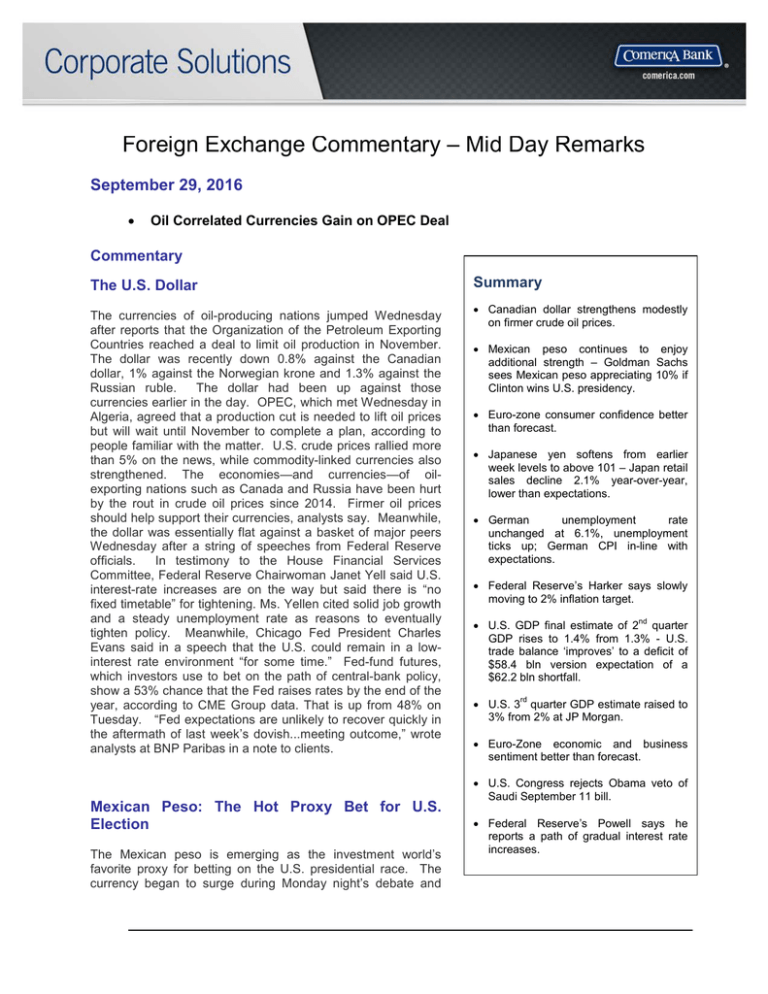
Foreign Exchange Commentary – Mid Day Remarks September 29, 2016 • Oil Correlated Currencies Gain on OPEC Deal Commentary The U.S. Dollar The currencies of oil-producing nations jumped Wednesday after reports that the Organization of the Petroleum Exporting Countries reached a deal to limit oil production in November. The dollar was recently down 0.8% against the Canadian dollar, 1% against the Norwegian krone and 1.3% against the Russian ruble. The dollar had been up against those currencies earlier in the day. OPEC, which met Wednesday in Algeria, agreed that a production cut is needed to lift oil prices but will wait until November to complete a plan, according to people familiar with the matter. U.S. crude prices rallied more than 5% on the news, while commodity-linked currencies also strengthened. The economies—and currencies—of oilexporting nations such as Canada and Russia have been hurt by the rout in crude oil prices since 2014. Firmer oil prices should help support their currencies, analysts say. Meanwhile, the dollar was essentially flat against a basket of major peers Wednesday after a string of speeches from Federal Reserve officials. In testimony to the House Financial Services Committee, Federal Reserve Chairwoman Janet Yell said U.S. interest-rate increases are on the way but said there is “no fixed timetable” for tightening. Ms. Yellen cited solid job growth and a steady unemployment rate as reasons to eventually tighten policy. Meanwhile, Chicago Fed President Charles Evans said in a speech that the U.S. could remain in a lowinterest rate environment “for some time.” Fed-fund futures, which investors use to bet on the path of central-bank policy, show a 53% chance that the Fed raises rates by the end of the year, according to CME Group data. That is up from 48% on Tuesday. “Fed expectations are unlikely to recover quickly in the aftermath of last week’s dovish...meeting outcome,” wrote analysts at BNP Paribas in a note to clients. Mexican Peso: The Hot Proxy Bet for U.S. Election The Mexican peso is emerging as the investment world’s favorite proxy for betting on the U.S. presidential race. The currency began to surge during Monday night’s debate and Summary • Canadian dollar strengthens modestly on firmer crude oil prices. • Mexican peso continues to enjoy additional strength – Goldman Sachs sees Mexican peso appreciating 10% if Clinton wins U.S. presidency. • Euro-zone consumer confidence better than forecast. • Japanese yen softens from earlier week levels to above 101 – Japan retail sales decline 2.1% year-over-year, lower than expectations. • German unemployment rate unchanged at 6.1%, unemployment ticks up; German CPI in-line with expectations. • Federal Reserve’s Harker says slowly moving to 2% inflation target. • U.S. GDP final estimate of 2 quarter GDP rises to 1.4% from 1.3% - U.S. trade balance ‘improves’ to a deficit of $58.4 bln version expectation of a $62.2 bln shortfall. nd • U.S. 3 quarter GDP estimate raised to 3% from 2% at JP Morgan. rd • Euro-Zone economic and business sentiment better than forecast. • U.S. Congress rejects Obama veto of Saudi September 11 bill. • Federal Reserve’s Powell says he reports a path of gradual interest rate increases. was up 2.5% by late Tuesday trading, its second-biggest daily gain this year. Pundits may still be jousting over the election’s outcome, but a number of investors said the gains were driven by perceptions of a strong debate performance by the Democratic nominee Hillary Clinton. Her GOP rival, Donald Trump, has lambasted a key U.S. trade pact with Mexico and has pledged to crack down on immigration. As Mr. Trump climbed in the polls this month, the peso plunged to a record low near 20 to the dollar. Bets it would keep dropping reached a record $2.2 billion last week, according to data from Scotiabank and the Commodity Futures Trading Commission that measures investments by hedge funds and other money managers. ‘Donald Trump’s odds of winning the election have a direct effect on the Mexican peso,’ said a strategist at Credit Suisse in New York. The strategist has been betting against the peso since late July and thinks the currency will continue to drift lower, in large part because he believes Mr. Trump’s policies would ‘bring massive amounts of uncertainty to Mexico.’ Whether currency traders are on to something or have just found a set of developments to speculate around is an open question. The GOP candidate’s rise isn’t the only reason for the peso’s troubles this year: The Mexican economy contracted in the second quarter as industrial production fell. And inflation is rising, which can be a headwind for a currency. Meanwhile, the Federal Reserve has signaled that it is inclined to raise interest rates in December. Yet during a year when low interest rates world-wide have sent investors chasing yield, many other emergingmarket currencies have rallied despite challenges of their own. Investors, for instance, have sent the Brazilian real up 23% against the dollar this year even as that country struggles with its worst recession in recent history. By contrast, the peso is down 11.2% since January, making it one of the worst-performing emerging-market currencies. Many currency traders believe Mr. Trump’s stated intention to renegotiate the North American Free Trade Agreement could damage the Mexican economy. Nafta eliminated most tariffs and other trade barriers between the U.S., Canada and Mexico, helping to boost sales of Mexican goods to the giant U.S. market. More than one-quarter of Mexico’s gross domestic product comes from trade with the U.S., according to data from Societe Generale while 81% of all its exports go the U.S., World Bank figures show. Mr. Trump’s plans to reduce immigration also could weigh on the Mexican economy. Remittances from Mexicans in the U.S. was the second-largest source of dollar inflows toward Mexico’s balance of payments, accounting for 2.3% of its GDP last year, according to BMO Capital Markets and the World Bank. Wall Street analysts have recommended other investments they say could perform well under the next president. Those nervous about a Trump presidency have suggested haven plays such as the Swiss franc and gold. Mr. Trump’s opposition to financial regulation and his support for a strong military in theory could boost sectors such as finance and defense. Some analysts say a win by Mrs. Clinton would likely benefit health care, since she has indicated plans to expand the number of people covered by the Affordable Care Act. Jack Ablin, chief investment officer at BMO Private Bank, wrote in a client note on Tuesday that gauging the election’s impact on equity markets is challenging given the range of variables affecting stocks. The impact on the peso, however, has been clear, he said. “We have found that Trump’s prospects have been moving in lock step with the Mexican peso’s exchange rate versus the dollar,” he wrote. “Of all of the metrics we’ve tested, it’s the one that has proven the closest barometer of election fortunes.” Traders appear to be braced for more big swings. The implied volatility of the peso against the dollar, which is a gauge of how much money investors are paying to insure themselves against or bet on large swings in the currency, has spiked to its highest level since 2011, according to Thomson Reuters data. Prices also show traders are betting volatility will come down after the election, according to RBC Capital Markets. “The Mexican unit has become something of an oversimplified risk proxy for worries about Trump,” Karl Schamotta, chief market strategist at Cambridge Global Payments, said in an email. Comerica Foreign Exchange -3551 Hamlin Rd., 2nd Floor Auburn Hills, MI 48326 1-800-746-6439 -301 E. Ocean Blvd., 18th Floor Long Beach, CA 90802 1-800-318-9062 -4100 Spring Valley, Suite 422 Dallas, TX 75244 1-800-736-6734 J. Ballow I. Bautista T. Blonshine C. Brower D. Chiappetta A. Cornejo S. Fontana H. Mackay A. Gil A. Holm S. Margrif D. Naum B. Petrak C. Ruben R. Schohl E. Sweiden S. Vasal Although the information contained in this report has been obtained from sources believed to be reliable, its completeness or accuracy is not guaranteed or warranted and is subject to change without notice. “In effect, the pros are trading ahead of punters who are expected to come into the market.” Axel Merk, president of Merk Investments LLC, has been betting against the currency since the beginning of September in some of his funds as a way to bet against risk. But he also sees Mr. Trump’s policies, including promises to erect a wall along the Mexican border, as another reason to stay short. “If you build a wall, maybe the peso will suffer,” he said. Todd A. Blonshine Senior Vice President - Western Division Foreign Exchange Manager Global Capital Markets (800) 318-9062 Comerica Foreign Exchange -3551 Hamlin Rd., 2nd Floor Auburn Hills, MI 48326 1-800-746-6439 -301 E. Ocean Blvd., 18th Floor Long Beach, CA 90802 1-800-318-9062 -4100 Spring Valley, Suite 422 Dallas, TX 75244 1-800-736-6734 J. Ballow I. Bautista T. Blonshine C. Brower D. Chiappetta A. Cornejo S. Fontana H. Mackay A. Gil A. Holm S. Margrif D. Naum B. Petrak C. Ruben R. Schohl E. Sweiden S. Vasal Although the information contained in this report has been obtained from sources believed to be reliable, its completeness or accuracy is not guaranteed or warranted and is subject to change without notice.

